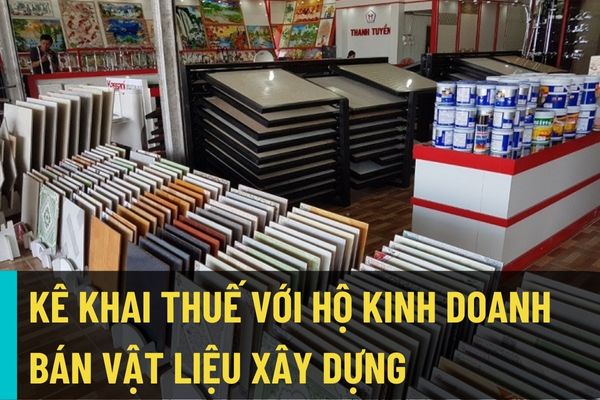Vietnam: Household business selling building materials with a turnover of VND 15 billion is a large-scale business household? How to do a tax return?
How should large-scale business households pay taxes in Vietnam?
In Question 11 of the Manual on Electronic Invoices No. 2 of the Tax Department of Ho Chi Minh City issued the following instructions:
- Large-scale business households do not have to pay flat tax as before but will keep simple accounting books, keep invoices and documents according to the provisions of Circular 88/2021/TT-BTC and take the initiative in making declarations and pay tax according to the actual arising.
How to identify large-scale business households and individuals in Vietnam?
The identification of business households and individuals doing large-scale business is specified in Clause 2, Article 3 of Circular 40/2021/TT-BTC, specifically:
+ For agriculture, forestry, fishery and industry, and construction: the average number of employees participating in social insurance annually is 10 or more; or the total revenue of the preceding year is 3 billion VND or more;
+ For the field of trade and services: the average number of employees participating in social insurance is 10 or more people per year; or the total revenue of the preceding year is 10 billion VND or more.
Thus, a building material business household with a revenue of VND 15 billion in 2020 is considered a large-scale business household.

Vietnam: Household business selling building materials with a turnover of VND 15 billion is a large-scale business household? How to do a tax return?
How should business households selling building materials make declarations, pay taxes, and use invoices in Vietnam?
Question 11 of the Manual on Electronic Invoices No. 2 of the Tax Department of Ho Chi Minh City issued the following instructions:
- Tax return period will be monthly or quarterly without having to settle at the end of the year like businesses.
- In the tax declaration file of the declarer, there will be a declaration to reflect the actual revenue generated in the period and an appendix attached to the declaration to reflect the actual expenses incurred in the period. - The requirement to declare information on actual expenses incurred in the period so that tax authorities have a basis for risk management in cases where there are signs of unreasonableness between output and input factors. It is possible to carry out the inspection at the business household's location.
- Although the tax authorities require information on expenses, the calculation of payable tax is calculated according to the ratio on revenue, not on the difference like enterprises.
- Business households applying the declaration method shall comply with the provisions of Articles 5 and 11 of Circular 40/2021/TT-BTC. Excerpt from Article 5 of Circular 40/2021/TT-BTC stipulating the tax calculation method applicable to business households and individuals paying tax according to the declaration method:
+ The declaration method applies to business households and individuals doing large-scale business; and business households and individuals that do not meet the requirements of large scale but choose to pay tax according to the declaration method.
+ Business households and individuals that pay tax according to the declaration method shall declare tax on a monthly basis, except for cases where business households and business individuals have just started doing business and business households and individuals meet the following criteria: Quarterly tax declaration and quarterly tax declaration options according to the provisions of Article 9 of Decree No. 126/2020/ND-CP dated October 19, 2020 of the Government.
+ If business households and individuals pay tax according to the declaration method, if it is determined that the taxable turnover is not realistic, the tax authority shall determine the taxable revenue according to the provisions of Article 50 of the Law on Tax Administration.
+ Business households and individuals paying tax by the declaration method must comply with the accounting, invoice, and voucher regime.
+ In case business households and individuals do business in the fields and lines of business with grounds for determining revenue as certified by competent authorities, they are not required to follow the accounting regime.
+ Business households and individuals that pay tax by the declaration method are not required to make tax finalization.
- In case the business household is a declaring household, it must carry out the procedures for registering the use of e-invoices as prescribed before using the invoice.
- To use e-invoices, declaring households need to prepare information infrastructure conditions, including computers/smart devices (smartphones, tablets) that can connect to the internet, digital signature, and electronic invoicing software.
- Business households need to directly contact the tax authorities directly managing them for instructions on registration and use of e-invoices according to the tax agency's roadmap.
Download Handbook on Electronic Invoice No. 2: Here.
LawNet
